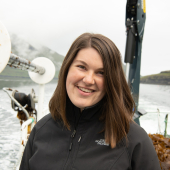
Takeaways from a kelp farming knowledge exchange in South Korea
Takeaways from a kelp farming knowledge exchange in South Korea
Bailey Moritz, Program Officer - Aquaculture, World Wildlife Fund, USA

Speaker
21 - 22 June 2023
Trondheim, Norway

Takeaways from a kelp farming knowledge exchange in South Korea
Bailey Moritz, Program Officer - Aquaculture, World Wildlife Fund, USA
About the speaker:
In her role at WWF-US, Bailey supports the seaweed industry in reducing barriers to growth and advancement for climate gains. Her current region of focus is the Eastern Pacific to the North Atlantic. She oversees grants to community organizations and research institutes focused on projects ranging from the ecosystem services of seaweed and shellfish farming to installing demonstration farms in new communities. She develops workshops aimed at driving new markets for seaweed, including as a livestock feed and alternative packaging material, bringing together stakeholders across the respective value chains. Bailey brings 10 years of marine science, education, and aquaculture experience. Prior to WWF, Bailey ran a commercial kelp nursery and a research-scale scallop farm in Maine. She has worked on seaweed farming projects in coastal communities in Madagascar and Belize as part of her graduate studies. Her research centered on a women’s association developing new seaweed-based products. She holds a BA in Earth & Oceanographic Science from Bowdoin College and a Professional Science Masters in Ocean Food Systems from the University of New England.
Company info:
As the world’s leading conservation organization, WWF works in nearly 100 countries. At every level, we collaborate with people around the world to develop and deliver innovative solutions that protect communities, wildlife, and the places in which they live.
Presentation:
A few months ago, a group of 15 seaweed farmers and industry leaders from Scotland, England, Wales, Alaska, Maine and Canada traveled to South Korea to immerse themselves in a week packed with first-hand learning and relationship building. In recognition of the mature state of Korea’s industry and transferable technology, the trip included visits to processing centers, farms, research institutes, and government offices. This presentation will highlight key takeaways from the participants perspectives and make the case for more trips of this nature to be organized in order to accelerate the growth of the industry, foster collaboration, and avoid reinventing the wheel.
